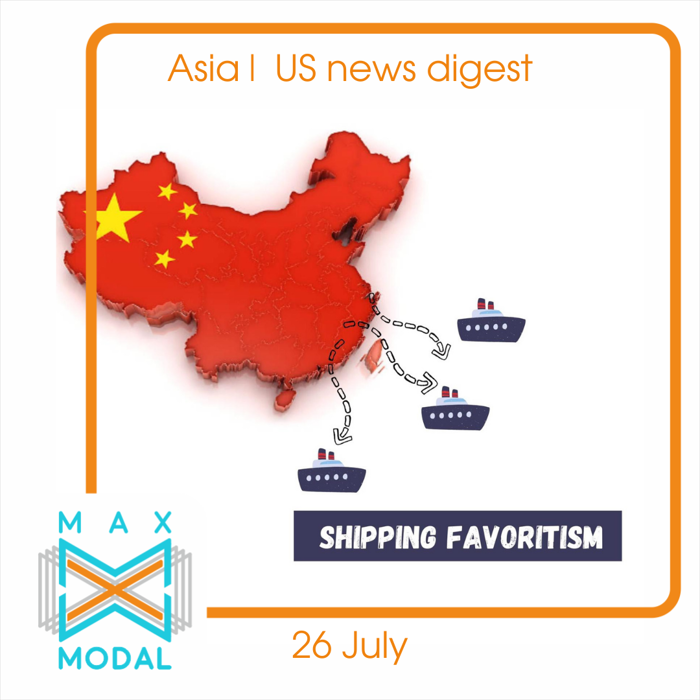Asia | US news digest. 26 July
Due to the closure of ports, China is no longer a piece of cake, so companies start favoring other options. Do the alternatives really work or is it equal to trading bad for worse?
Closures of ports all over the world continue to take place this time with the shutdown of Shanghai’s container port and airport that happened over the weekend due to a typhoon. Although things are slowly returning to normal, customs processing of imports into CGO is delayed as well as some flights. Floods have also affected other regions in China including Ningbo, one of the largest ports. As the result, transportation disruptions have moderately concerned local export.
Consequently, some companies start avoiding tariff risk in China and one of the brightest examples of such strategy is Guess. In the light of the new economic challenges, which also include the tension between the US and China, it starts leaning towards its suppliers in India and Bangladesh. However, taking the new health restrictions, the latter can be a challenging option as the lockdown in Bangladesh has started taking a toll on the shipping sector. Now importers are hardly taking delivery of containers. Among other valuable criteria is CSR that has become important for other industries.
The choice of the next step is such shaky ground that shippers all over the world are simply about to give up on trying to look for the perfect strategy. Especially when every time they look, the rates go higher – there are now indicators that the current situation will extend beyond Chinese New Year. What is more certain is that more and more experts agree that regardless of when things settle, the industry is not going to witness a return to pre-Covid pricing levels for ocean freight.
Meanwhile, the discussion of demurrage fees escalates as STB sends its letter to Class I railroads calling to explain their demurrage policies. According to the notice, demurrage does not provide any constructive incentives and consistently results in massive charges that can exceed the commercial value of the shipments. With the recent congestions at ports and railroads, it has only added another log to the fire.
Despite the challenges, there is always room for innovation. At least in rail. It is unclear whether Laude Smart Intermodal S.A’s new container is going to be a game-changer for the New Silk Road or it is a clickbait-like initiative amid to improve the company’s communication strategy. The highly developed container for transportation between China and Europe is expected to increase capacity by 25-30% compared to standard 40’ high-cube containers. In addition to the new technology, Laude Smart Intermodal is expanding its terminal in Zamość on the Polish-Ukrainian border.
To paraphrase a famous guessing game “Hot’n’Cold”, DP World and Rosatom seem to have decided to choose the “coldest” take and develop the Northern Transit Corridor in the Arctic as a sustainable sea route between Asia and Europe. DP World has already committed to invest $2 bn and is planning to tap further into the partnership. This is not the only sustainable initiative among the recent projects. The HyperPort project between Hyperloop Transportation Technologies and Hamburger Hafen und Logistik can offer a greener and more efficient inland supply chain for containerized goods.
Whether it will be technologies or new regulations that bring a much-needed change, the cargo throughput keeps increasing at the US ports. To address the issue, the Port of Oakland has identified areas of upgrades for its seaport focusing not only on the improvement of the facility but professional training of the employees. Experts back up this strategy outlining that cargo demand is outpacing capacity investment and improving cargo flow should be one of the main priorities. The skyrocketing throughput is also common for Chinese ports that has totaled 138.2 million TEU in the first half of 2021, a year-on-year (YoY) increase of 15%.
In addition, newbuild prices are also expected to go north after two Korean conglomerates have announced sharply contrasting fortunes.Underinvestment in shipping can drive prices further, although the final situation will depend on the sentiment in the direction of steel prices.
Maersk keeps expanding its capacity. This time Chinese CMB Financial Leasing has ordered two TEU ships from Guangzhou Shipyard International for a long-term lease to the industry’s giant. So far, MSC has been the most active in buying second-hand ships, with at least 60 bought since last September.
GL Terminal has declared that one of the world’s largest shipping lines (the name has not been revealed) has appointed the company to provide container depot and trucking services in Jakarta. The company will offer the following services, including empty container handling and storage, container inspection, cleaning and repair, and empty truck repositioning.


